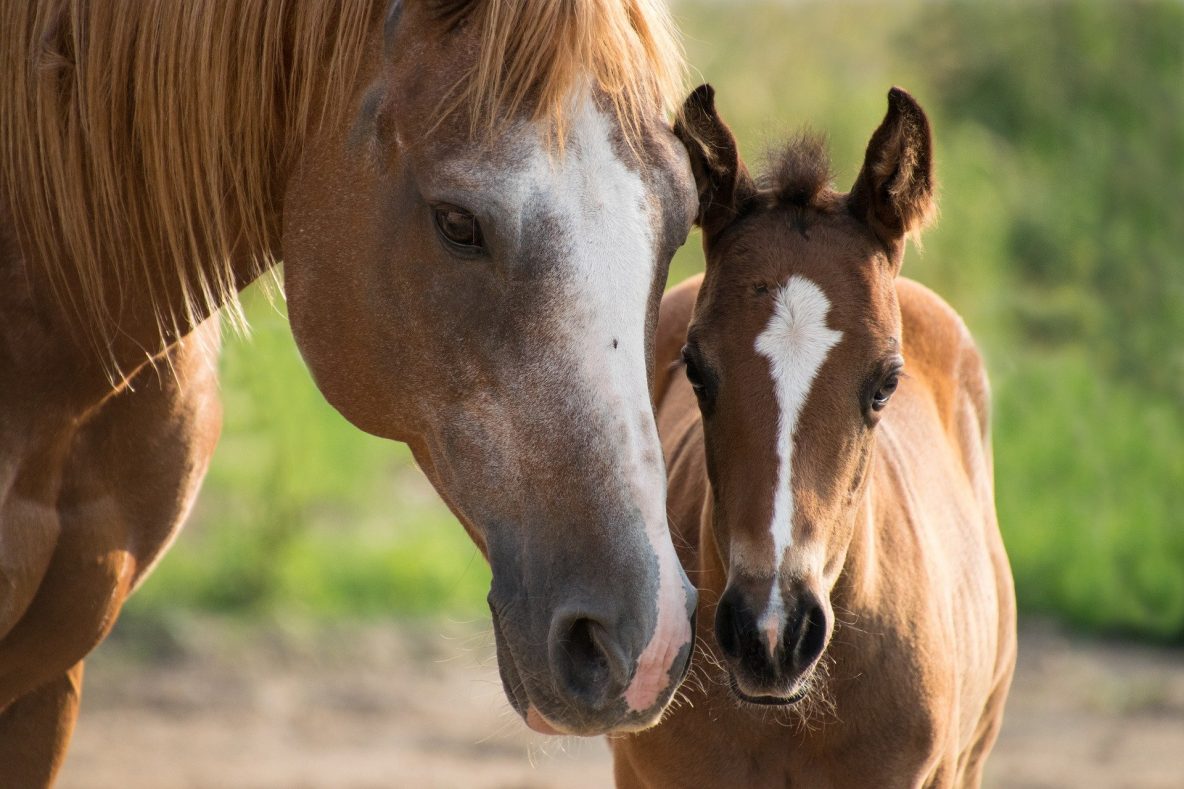POST FOALING CHECK
We strongly recommend that owners have a post foaling check carried out by your vet for both mare and foal, so any abnormalities, injuries or problems can be dealt with early.
The first 24 hours post-foaling are critical for both the dam and her new-born foal.
Important questions that an owner should ask:
✔ Is there a good maternal affinity, is the mare happy to have the foal around her udder or is she rejecting the foal, biting, kicking the foal?
✔ Is the behaviour of the foal normal with respect to both its dam and the environment? Therefore, does the foal recognize the dam and it is seeking the udder and effectively suckling? Does it bump into walls? Is there milk on the foal’s face? Is the mare’s udder full or empty?
✔ Is the mare bright, alert, eating normally, passing droppings? Does she show any signs of discomfort? Is the foal able to stand by itself and go to suckle, has it passed the meconium, urine? Does the foal look lethargic or is it responsive to external stimuli, bright and inquisitive?
What does the vet check involve?
✔ The clinician will perform an assessment of all body systems, which include eyes, mucus membranes, heart, lungs and temperature check. The chest is carefully palpated to assess the presence of rib fractures. The abdomen is palpated for distension and examined by auscultation. The umbilicus is palpated to detect any swelling, abnormal thickening or heat, as well as to record the presence of an umbilical or inguinal hernia. The limbs are inspected for angular and flexural deviations, joints are palpated for any heat, pain and swelling.
✔ A blood sample is taken from the foal to assess the IgG antibody level. Foals are born with an inadequate defence system. In other words, the antibodies (Immunoglobulin IgG), molecules that help the body to resist pathogens (bacteria, virus etc), are absent in the blood stream of the foal. In order to get this immunity, foals must take the colostrum from the dam. The colostrum is a complex of nutrients, high levels of immunoglobulins, protective substances for the gut and also has a laxative effect, which stimulates the foal to pass meconium, the hard, ball shaped faeces. The absorption of the colostrum through the gut is maximum over the first 12 hours of life, then, gradually, declines over the 18-24 hours post foaling. After 24 hours of age, there is no more absorption from the intestine.
N.B. colostrum is produced only once. Leakage of colostrum is therefore, likely to result in a reduced colostral supply for the foal. “Failure of passive transfer of immunity” is the condition that describes this inadequate/absent passive transfer of immunoglobulins which, in the end, can leave the foal exposed to the numerous pathogens present in the environment.
✔ The foal will also receive a Tetanus antitoxin (TAT) injection, if required. As previously said, the foal does not have any natural defence against pathogens, and may be exposed to the spore of the clostridium tetanus on bedding and soil. The Tetanus antitoxin is a specific antibody ready to act against Tetanus bacteria. If the foal is born from a mare regularly vaccinated for tetanus, the antibodies will be passed through the colostrum. However, if the vaccination history of the dam is unknown, or the foal has failure of passive transfer immunity, then Tetanus antitoxin is indicated. If the dam has been regularly vaccinated against Tetanus and the foal has sucked colostrum well, then we do not give Tetanus antitoxin as a routine, unless specifically requested.
✔ Placental check (remember to keep it in a bucket or in a bag): the placenta is examined for two reasons: first to confirm that all the placenta was passed, therefore nothing is left in the dam’s uterus, a situation that would need to be considered as an emergency for the mare’s health; secondly, to check for the presence of abnormalities such as thickening, discoloration, plaque formation, and exudate fluid. It might be necessary, in rare cases, to take some samples for histology examination. The placenta and foal are considered as a “unit” over the pregnancy and any abnormalities to the placenta could indicate a disease of the foal.
✔ A full physical exam of the mare to assess her attitude with the foal, her cardiovascular status and to identify any issues that may have occurred during foaling. The vulva will be examined for laceration which can vary in severity. A vaginal, cervical and uterine examination might need to be carried out in cases of colic, suspected retention of part of the placenta, bleeding or bruising. A uterine lavage may be recommended in cases of metritis (infection) post-foaling.
✔ In rare cases, other diagnostics can be carried out either on the dam and/or the foal if deemed necessary, e.g. haematological assessment or ultrasound examination.
✔ We do not recommend the routine use of antibiotics in new born foals which appear healthy, have sucked well and are born on clean bedding or pasture. We recognise that there may be specific occasions when antibiotics are indicated as a result of our examination, history and laboratory tests.

